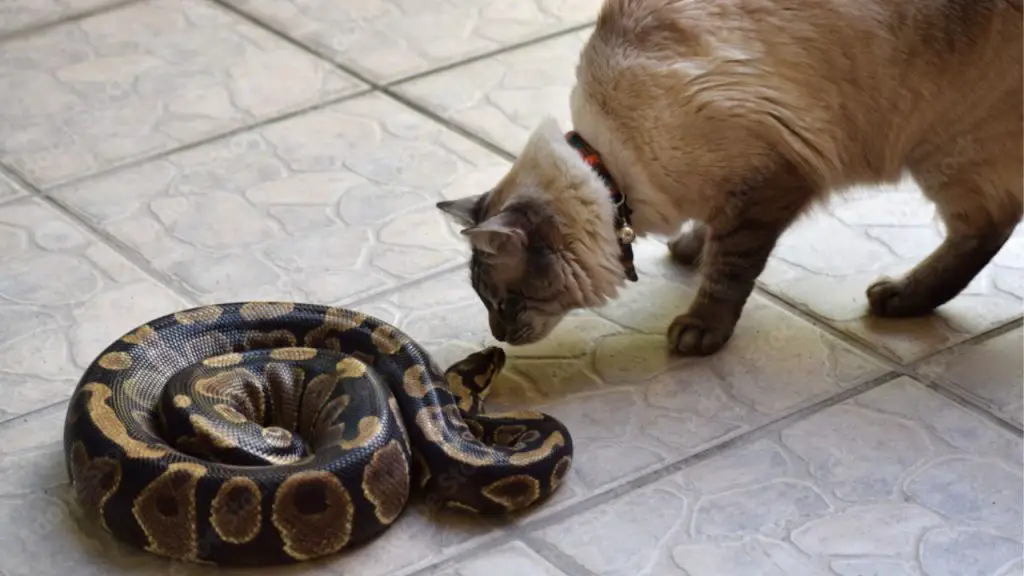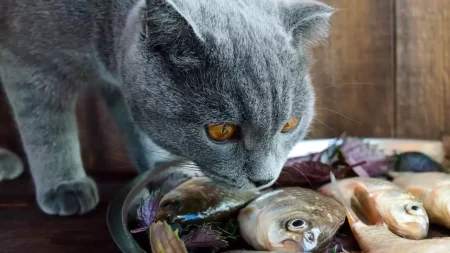Are you a pet owner? Have you heard that snakes can kill cats? Can a ball python do this? Fear not – the chances of a ball python slaying an adult cat is near zero! In this article, you’ll discover why. Ready to find out if ball pythons can be predators? Let’s go!
Can a ball python kill an adult cat? It’s a common misconception that larger pythons, like the ball python, can easily swallow and kill an adult cat. But, this isn’t true. Pythons are known for being strong and fast, but not enough to overpower an adult cat.
Let’s look into the background info about pythons in more detail. We will also dive deep into their strength and capability of killing cats:
What Is A Ball Python?
Ball pythons, or Royal Pythons, are nonvenomous snakes native to Africa. They are one of the most popular pet snakes due to their gentle nature and small size. Often called “beginner snakes,” they grow to be three to five feet long. With proper care, they can live up to 20 years in captivity.
They come in a wide range of colors, patterns, and morphs. Ball pythons are usually solitary creatures. But, similar size snakes can be kept together in captivity. Breeding ball pythons have become popular in recent years. This is due to the demand for new morphs, resulting from selective breeding.
Possible Confrontation Between a Ball Python and an Adult Cat
A ball python’s reaction to a domestic cat can be aggressive. Hissing, striking, and defending are all signs of this. If the cat retaliates, the python could be seriously injured or even die. Though rare, cats being faster and stronger than pythons, cats may not seek confrontation unless threatened. Also remember that an average cat’s reaction time is just 20-70 milliseconds, which is a lot faster than the average snake’s reaction time.
To avoid confrontations between ball pythons and cats, owners should keep them apart. Separating them into different rooms with secure doors is a good way to do this. Also, provide both animals with hiding places so they can feel safe without meeting each other.
The Likelihood of a Ball Python Killing an Adult Cat
Ball pythons are part of the Pythonidae family and are usually classified as least-risky, nonvenomous constrictor snakes. They are not as strong or big as boas or anacondas. They can only wrap themselves around an adult cat once or twice max. Their ability to kill an adult cat is zero.
In most cases, when a ball python and a domestic cat come into contact outside of cages, they won’t engage each other. The cat is usually uninterested in attacking the small python. The python doesn’t show any threat features to make the cat fear it.
If they were to face each other without containment, the much larger domestic cat would take charge by pinning down the small reptile with its size and strength. If there was an altercation, that’s what would happen.
Ball Python Strength and Speed
Ball pythons, also known as royal pythons, won’t usually threaten an adult cat. They’re constrictor snakes that only take down prey slightly bigger than themselves. Even the largest ball python can’t overpower a full-grown cat.
These snakes move slowly on land or in water and stay on the ground. So, they have little luck catching small animals like mice or rats. An average ball python is only 4ft. long and weighs 2 lbs. That means it’ll struggle against something as big as an adult domestic cat.
Ball pythons go for smaller prey like
- chicks,
- lizards,
- and rodents.
They’re likely to avoid cats unless feeling cornered or threatened. So, close supervision is wise when reptiles like ball pythons are near other pets.
What Happens When a Ball Python and Domestic Cat are Left Alone and Out of Cages?
It is unlikely the ball python will hurt the domestic cat. Ball pythons are not strong or fast enough to catch or kill a grown cat. But, if they come into contact, one of two things will happen. They will ignore each other or the cat will chase the snake until it gets bored. Even if this happens, no harm will come to either.
Since cats don’t have venomous fangs, they can’t inject venom and subdue or kill their prey.
What Precautions Should You Take to Keep Your Cat Safe Around a Ball Python?
To ensure your feline friend’s safety from a ball python, it’s important to consider their natural instincts. While cats cannot be trained like dogs, it’s crucial to monitor them closely and prevent them from wandering too close to the python’s enclosure. In the event that your cat does come into contact with the snake, remain calm and gently separate them from its deadly grasp. While it’s best to avoid keeping a ball python as a pet altogether, ultimately the decision is yours. Just be sure to take all necessary precautions to protect your cat from becoming a tasty meal.
Can a Ball Python Constrict and Suffocate a Cat to Death?
Did you know that ball pythons are actually unlikely to pose a threat to your beloved feline? While they may seem intimidating, these serpents are not physically strong enough to overpower or kill a cat.
These non-poisonous creatures use constriction as their primary hunting and killing technique. They wrap themselves around their prey and squeeze tight, causing the animal to suffocate and eventually perish. While ball pythons are not usually aggressive hunters, they may still attack prey that they can overpower and eat easily. However, as a responsible pet owner, it’s important to prioritize the safety of your cat. It’s never a good idea to leave your cats or any other pets alone with a snake. Even if the snake feels threatened or provoked, it has the potential to harm your pet.
To prevent harm, it’s better to take precautions beforehand and keep your cats away from predators. By doing this, you can make sure that your pets remain healthy and happy. So, whether you have a ball python or any other pet, always remember to prioritize their safety and well-being.
What Steps Should You Take If Your Cat Gets into a Fight with a Ball Python?
If your cat and a ball python get into a fight, act fast to protect both animals. Follow these steps:
- Separate the animals: Gently use a broom to remove the cat’s mouth from the snake. Avoid twisting or pulling the cat’s head, which can harm both animals. Carefully unwind the snake if it has wrapped around the cat.
- Check for injuries: Inspect the cat and snake for any signs of bleeding or puncture wounds. If you notice any, take them to the vet immediately.
- Provide first aid: If the cat has been bitten, clean the wound with soap and water and apply a cold compress to reduce swelling. Keep an eye on the cat for any reactions like swelling or breathing difficulties.
- Secure the snake: If the ball python is still around, capture it and put it in a secure container. Remember to handle it with care to prevent stress or injury.
- Monitor both animals: Observe the cat and snake closely for several days. If you see any signs of infection or complications, take them to the vet.
Cats are predators and snakes are prey, so it’s best to keep them apart to prevent future conflicts.
Is it Safe to Keep a Ball Python and a Cat in the Same Room?
Having a ball python and a cat in the same room can pose risks, as cats may view the snake as prey and attack it, potentially causing harm or death. Moreover, some snakes may experience stress when near predators, impacting their well-being. If you decide to house both pets together, it’s crucial to take safety measures. Make sure to keep the snake in a secure enclosure with a locked lid to prevent the cat from getting to it, and monitor the cat’s behavior and interaction with the snake closely. It’s generally advisable to keep different types of pets in separate areas to avoid potential mishaps. If you’re uncertain about the safety of cohabitation, consulting a veterinarian or animal behaviorist for guidance is best.
Conclusion
The end result? A ball python cannot kill an adult cat. It is too weak and slow. But, if it happens to meet a domestic cat, the cat will most likely win. To be safe, keep the two apart. Put them both in their own cages, and don’t let them near one another.







